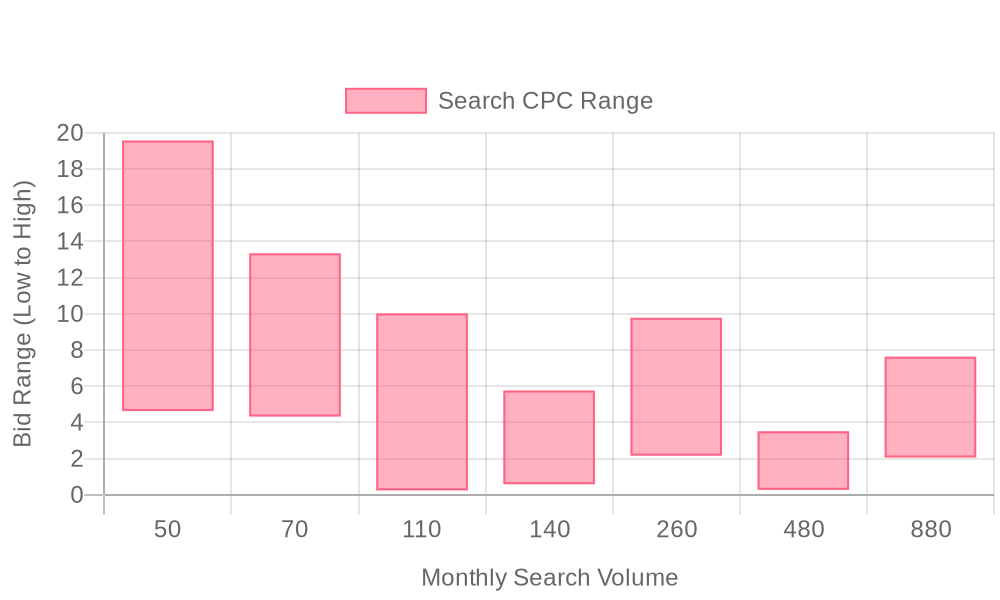
Supercharge your lead generation with a FREE Google Ads audit - no strings attached! See how you can generate more and higher quality leads
Get My Free Google Ads AuditFree consultation

No commitment
Supercharge your lead generation with a FREE LinkedIn Ads audit - no strings attached! See how you can generate more and higher quality leads
Get My Free Google Ads AuditFree consultation

No commitment
Supercharge your lead generation with a FREE Meta Ads audit - no strings attached! See how you can generate more and higher quality leads
Get My Free Google Ads AuditGet My Free LinkedIn Ads AuditGet My Free Meta Ads AuditFree consultation

No commitment
Supercharge your lead generation with a FREE Google Ads audit - no strings attached! See how you can generate more and higher quality leads
Get My Free Google Ads AuditFree consultation

No commitment
In today's complex marketing landscape for medical case management, a strategic mix of both online and offline channels is crucial for successful B2B marketing. Google Ads plays a pivotal middle-funnel role in capturing high-intent prospects at the exact moment they're searching for solutions. This effectively bridges the gap between broader awareness efforts and the sales process. Missing high‑value prospects because they aren’t tracked can result in lost opportunities in medical case management, where timely engagement with decision-makers is essential. Google Ads offers the ability to target based on specific technical and service-related terms, ensuring the alignment of ad spend with actual search intent, enhancing both patient acquisition and program visibility.

Medical case management teams face constant pressure to connect with decision-makers and patients who require tailored care coordination. Precision and speed are paramount, as every missed connection can mean lost opportunities for both patient outcomes and business growth.
Effective lead generation in this sector hinges on more than broad digital outreach. Marketers need a system that delivers medical case management advertising to high-intent prospects precisely when they're searching for help, while also aligning every engagement with compliance and conversion best practices. Google Ads management for medical practices provides a direct channel to those searching for support, but success depends on expert targeting, real-time optimization, and seamless integration with your wider healthcare digital marketing ecosystem.
Google Ads remains a cornerstone of PPC for medical practices, especially for specialized services like medical case management. With millions searching for health solutions daily, a well-structured campaign ensures your team is visible in critical micro-moments—when patients, caregivers, or hospital partners are actively seeking answers. This platform offers unmatched intent targeting, powerful enough to surface your services for queries such as “case manager for chronic illness” or “post-discharge care coordination.” For organizations seeking to deepen their strategy, our healthcare marketing insights provide actionable best practices.
Beyond reach, Google Ads for healthcare marketing empowers you to capture and nurture leads quickly. By connecting ad clicks to identified web visitors, marketers can move beyond anonymous web traffic, identifying which organizations or individuals are engaging with your messaging. This data-centric approach enables immediate and personalized follow-up, reducing the lag between inquiry and engagement—a crucial factor for medical case management where fast response dramatically improves both conversion rates and patient trust.

Step 1: Build Targeted Keyword Lists
Start with comprehensive keyword research designed around your core services and audience pain points. Identify not only generic terms like “case management” but also detailed, intent-driven keywords such as “transitional care case manager” or “worker’s compensation case management help.” Use negative keywords to filter out unrelated searches, ensuring your budget focuses only on high-conversion intent. Best practices for Google Ads in healthcare can help structure your keyword strategy for maximum ROI.
Step 2: Define and Refine Audience Segments
Precision audience targeting is essential for medical PPC strategies. Leverage demographic filters, location targeting, and in-market segments to reach hospital administrators, insurance partners, or family caregivers. Go beyond simple demographic targeting by using real-time audience segmentation to identify visitors who have recently engaged with specific care-related content or exhibited in-market behavior. Dynamic audience lists update automatically as prospects move through the funnel, ensuring your message always reaches those most likely to convert.
Step 3: Align Creative for Conversion
Create ad copy and visuals that speak directly to medical case management pain points—emphasizing outcomes like smoother care transitions, reduced readmissions, or 24/7 patient advocacy. Test multiple headlines and descriptions that address both patient and referral decision-maker concerns. Use structured ad extensions to highlight specializations, certifications, or direct contact options, driving higher click-through and engagement rates. For additional inspiration, explore healthcare Google Ads campaign examples.
Step 4: Integrate with CRM and Analytics
Seamless CRM and ad platform integration is vital for attributing leads to the right source and nurturing them through the sales funnel. Sync enriched lead data from Google Ads directly into your CRM to enable real-time sales follow-up and personalized outreach. Automatic audience data sync with your CRM and ad platforms helps ensure timely, informed follow-up. Advanced conversion tracking ties both online and offline actions—such as calls, form fills, or in-person consults—back to specific campaigns, giving a true picture of ROI and informing future budget allocations.
Step 5: Optimize and Scale
Continuous optimization differentiates high-performing medical case management advertising from average campaigns. Use granular conversion data to adjust bids, pause underperforming keywords, and expand into new audience segments as you gather more intent data. Automated rules and first-party intent signals help you scale spend on campaigns driving the best patient engagement and lead quality.
A unified approach to Google Ads healthcare marketing, when executed with real-time data and robust integration, ensures your case management team stays ahead in a competitive market—connecting with the right prospects, at the right time, with the right message. To streamline your lead generation and campaign optimization, get started for free with Sona.
Google Ads empowers medical case management providers to reach decision-makers during critical moments of research and evaluation. By aligning ad delivery with high-intent search behaviors, campaigns ensure that complex, higher-margin services such as comprehensive case reviews and care coordination plans are positioned in front of the right audience at the right time. For a closer look at how tailored strategies drive patient leads, explore specialized Google Ads management for medical practices.
In this specialized healthcare sector, traditional marketing often falls short because it lacks the precision to identify which organizations or professionals are actively seeking case management expertise. Google Ads, when paired with advanced analytics, bridges this gap by providing visibility into the accounts and companies engaging with high-value web pages. Marketers can leverage account identification to prioritize leads showing strong buying signals, reallocating budget toward prospects most likely to convert.
Account-level insights go beyond anonymous traffic metrics, revealing which hospital systems, payers, or referral networks are interacting with key service pages. This allows revenue teams to customize ad messaging and follow-up strategies according to real-time engagement data. When dynamic audience segments adjust automatically as leads move through the sales funnel, outreach remains relevant and timely, accelerating the path from initial interest to contract negotiation.
For medical case management providers aiming to optimize digital spend, Google Ads delivers quantifiable results. The platform’s direct attribution and online-to-offline conversion tracking enable marketers to measure true ROI, connecting every ad dollar to downstream outcomes such as scheduled consultations or signed service agreements. To experience data-driven campaign improvements firsthand, get started for free with Sona.

Disconnected or inconsistent intent signals across these campaign types often result in diluted messaging and lower conversion rates. Integrating all touchpoints and leveraging real-time data ensures that marketing communications are aligned, timely, and tailored for every interaction. This synchronization is critical in healthcare digital marketing, where trust and accuracy directly influence engagement and patient acquisition outcomes. Ready to streamline your campaigns? Get started for free with Sona.

Growth in medical case management advertising hinges on expanding beyond generic healthcare campaigns and tapping into vertical-specific search intent. Targeting keywords related to particular medical specialties—such as chronic disease management, elder care coordination, or post-acute care—brings your services in front of decision-makers seeking highly tailored solutions. For a deeper understanding of medical case management and its impact, review this encyclopedic overview. This approach captures underserved audiences and positions your organization as a specialist, not just a general provider.
Conducting a thorough competitor gap analysis reveals market segments where patient needs are not fully addressed. By identifying which conditions or service offerings competitors overlook, you can design campaigns aimed at those gaps, improving engagement rates and lead quality. For advanced strategies in demand generation and campaign design, explore B2B marketing best practices. For instance, if competitors neglect transitional care or rare disease management, these become opportunities for differentiation.
Content retargeting with educational assets such as whitepapers, outcome-driven case studies, or explainer videos builds trust and advances prospects through the funnel. Rather than relying on a single campaign for all audiences, segment messaging to align with the real challenges and informational needs of distinct groups: patients, caregivers, or healthcare administrators. This tailored approach ensures higher relevance, fosters ongoing engagement, and increases the likelihood of conversion.
With advanced visitor identification and real-time intent analytics, marketers move beyond anonymous web traffic and uncover which organizations are actively researching case management services. Dynamic audience syncing keeps your Google Ads targeting aligned with current CRM data, automatically updating segments as prospects move closer to a decision. These capabilities allow ad budgets to shift toward in-market accounts and ensure that high-conversion opportunities receive the right message at the right time, maximizing ROI and supporting sustained growth in the medical case management space.

Audience segmentation for medical case management unlocks precision targeting that elevates ROI and lead quality. By structuring campaigns around well-defined segments, marketers can deliver more relevant messaging and drive higher engagement from both healthcare organizations and referring providers. For further strategies, explore our B2B marketing playbooks.
Successful segmentation starts with clear definitions of your core audiences. Hospitals, private practices, rehabilitation centers, and long-term care facilities each represent distinct opportunities within medical case management. Segmenting these groups allows marketing teams to tailor ad copy, landing pages, and value propositions to the specific needs and decision criteria of each type of healthcare organization. For example, messaging for hospitals may focus on complex discharge planning and readmission reduction, while private practices might respond to patient navigation benefits or support for chronic disease management. For a comprehensive overview, review this encyclopedic guide to medical case management.
Overlaying real-time intent signals further refines targeting. Tracking behaviors such as recent searches for emergency care coordination or high-need case management allows rapid budget shifts toward in-market prospects. This dynamic approach ensures ad spend consistently supports accounts with the greatest likelihood to convert. Integrated platforms can tie in visitor identification, enabling marketers to move beyond anonymous traffic and pinpoint which organizations or professionals are engaging with ads. This empowers sales and marketing teams to prioritize follow-up with high-value accounts based on real engagement data.
Creating ad groups tailored to each segment is crucial for maximizing campaign results. Separate groups for hospitals, specialty clinics, and referring physicians enable marketers to test different offers and creative elements, optimizing for what resonates within each audience. Validation of conversion paths ensures that once a prospect engages, their journey is tracked accurately from initial click through to CRM capture, whether the lead originates from a form fill, phone call, or offline conversation. When CRM and ad platforms are seamlessly integrated, audience data automatically syncs between systems as leads progress through the funnel. This alignment eliminates silos that often cause wasted ad spend, ensuring both marketing and sales have unified, actionable insights to nurture accounts and close more qualified opportunities.

| Industry | Keyword | Monthly Search Volume | Competition Level | Low Bid | High Bid |
| Medical Case Management | medical case management companies | 50 | LOW | 4.63 | 19.57 |
| Medical Case Management | healthcare network management | 70 | LOW | 4.33 | 13.34 |
| Medical Case Management | health insurance case manager | 110 | LOW | 0.25 | 10.02 |
| Medical Case Management | health care case manager | 140 | LOW | 0.59 | 5.76 |
| Medical Case Management | case management healthcare | 260 | LOW | 2.17 | 9.78 |
| Medical Case Management | medical case | 480 | MEDIUM | 0.28 | 3.51 |
| Medical Case Management | medical case management | 880 | LOW | 2.07 | 7.63 |
A high-performing campaign for Google Ads for Medical Case Management begins with a keyword approach rooted in buyer intent and precise audience segmentation. Modern B2B revenue teams need to capture qualified leads searching for care coordination, patient advocacy, and chronic condition management solutions by aligning ad spend to the decision journeys of healthcare administrators, payers, and referral partners. The most effective strategies deploy terms like "medical case management solutions," "patient care coordination," "chronic disease case management," and "care transition services," layered with geo-modifiers such as city or region names for local market penetration. For more guidance, explore Google Ads strategies for healthcare marketing.
To drive only qualified traffic, negative keyword filters exclude irrelevant queries like "free case management training" or "case manager jobs," ensuring budgets are reserved for true buying signals. Dynamic keyword lists, updated in real time as funnel stages progress, help marketers capitalize on shifts in demand and intent. Integrating Sona Identification enables teams to move beyond anonymous clicks, directly connecting new high-value companies to active campaigns and uncovering demand not visible in standard keyword reporting. When a healthcare organization shows in-market behavior or surges in research activity, budget can be shifted immediately to capitalize on these high-conversion windows.
Strategic use of video ad formats amplifies engagement for medical case management advertising, especially when educating stakeholders about complex service offerings or establishing trust in a clinical setting. Video keywords focus on solution awareness and differentiators, such as "how medical case management improves patient outcomes" or "case management for hospital discharge planning." By connecting keyword intent to Sona’s Buyer Journeys, revenue teams maximize Google Ads targeting for healthcare, improve patient engagement, and reinforce online visibility for medical practices.
Effective Google Ads for Medical Case Management starts with meticulous keyword planning. Cluster keyword groups by specific service offerings, such as chronic disease coordination, hospital discharge planning, or elder care navigation, to mirror the real search intent of patients and referring professionals. Localize strategies with geographic modifiers, targeting "case management near me" or "[city] patient advocacy" to drive highly qualified, location-based traffic. Integrating real-time visitor identification allows marketers to move beyond broad targeting, pinpointing not just anonymous searchers but also the specific organizations and healthcare systems visiting your site. This precision, when combined with dynamic audience data, ensures that campaigns are always focused on the right segments as prospects move through the funnel.
Crafting ad copy for healthcare marketing requires a focus on credibility, empathy, and compliance. Highlight specialized certifications, accreditations, and deep expertise in managing complex cases to build immediate trust with both patients and referring clinics. Incorporate urgency incentives—such as rapid response teams or same-day consultations—to convert high-intent searchers at the moment of need. Copy should remain compliant with healthcare advertising policies, avoiding unsubstantiated claims while clearly communicating value. Using unified data across platforms, marketers can dynamically update and personalize copy based on real-time signals, ensuring each ad resonates with the visitor’s current stage in their decision process.
Landing pages for medical PPC strategies must prioritize clarity, accessibility, and conversion. Each page should feature a prominent call-to-action, concise service explanations, and multiple contact options, including click-to-call for mobile users. Mobile-friendly layouts are essential in Google Ads healthcare marketing, reflecting patient and caregiver preferences for on-the-go research and engagement. By syncing CRM and ad data, providers can ensure landing pages display relevant content and prefill forms for known users, removing friction and boosting lead quality. Tracking every engagement point across the landing experience empowers revenue teams to understand which content, CTAs, and design elements drive the highest patient engagement and conversion rates.
Continuous optimization underpins effective Google Ads for Medical Case Management. Leverage automation to refine bidding strategies and dynamically allocate budget to the most effective keyword and audience segments. Advanced conversion tracking links both online and offline actions—such as phone inquiries, appointment bookings, and in-person consultations—creating a complete attribution picture for true ROI measurement. Funnel disconnects are resolved by ensuring every stage, from initial search to final conversion, communicates insights across marketing, sales, and care teams. Real-time audience and lead syncing between Google Ads and CRM systems ensures that high-intent accounts are prioritized and engaged with timely, personalized outreach, maximizing the impact of every advertising dollar. Ready to see measurable results? Get started for free with Sona.

Expanding your medical case management presence requires a deliberate approach that integrates educational content across multiple marketing channels. This strategy not only builds trust with potential clients but also positions your services as essential resources for high-value patient populations. Explore our blog for more strategies on elevating your medical marketing.
Modern medical case management marketers increasingly rely on unified platforms that merge advertising, CRM, and analytics data. This integration solves the challenge of fragmented touchpoints by providing a single view of each buyer journey. With comprehensive attribution, you can accurately measure the ROI of healthcare digital marketing, refine Google Ads for patient engagement, and improve conversion rates through precision retargeting and dynamic audience updates. To streamline your marketing efforts, get started for free with Sona and experience unified data activation.
In conclusion, effectively utilizing Google Ads for medical case management can significantly elevate your visibility in the competitive healthcare market. By strategically leveraging this powerful advertising tool, you can attract new clients and enhance your service promotion efforts.
Throughout this article, we explored the core challenges faced by medical case management services, such as standing out in a crowded field and reaching the right audience. Key solutions discussed include targeting specific demographics, using relevant keywords, and optimizing ad performance to maximize your return on investment.
Unlocking the potential of Google Ads enables you to transform your outreach efforts and achieve greater success in connecting with those in need of your services. Embrace the opportunity to enhance your marketing strategy and see the transformative impact it can have on your business growth.
Ready to take the next step? Start for free to experience our platform and its capabilities today.
The best practices for using Google Ads in medical case management include targeting high-intent keywords, refining audience segments, creating conversion-focused ad copy, integrating with CRM systems for seamless follow-up, and continuously optimizing campaigns based on real-time data.
Google Ads can improve patient acquisition by targeting high-intent prospects at critical moments, connecting ad clicks to engaged web visitors, and enabling personalized follow-up, which reduces the lag between inquiry and engagement.
Restrictions on advertising medical services through Google Ads include adhering to compliance with healthcare advertising policies, avoiding unsubstantiated claims, and ensuring remarketing strategies comply with healthcare regulations.
To set up a Google Ads campaign for medical case management, start with keyword research, define audience segments, create compelling ad copy, design effective landing pages, integrate with CRM and analytics, and continuously optimize based on performance data.
Metrics to track include conversion rates, click-through rates, cost per acquisition, engagement levels, and ROI, which are all vital for measuring the success of Google Ads in healthcare.
Join results-focused teams combining Sona Platform automation with advanced Google Ads strategies to scale lead generation

Connect your existing CRM

Free Account Enrichment

No setup fees
No commitment required

Free consultation

Get a custom Google Ads roadmap for your business
Join results-focused teams combining Sona Platform automation with advanced Meta Ads strategies to scale lead generation

Connect your existing CRM

Free Account Enrichment

No setup fees
No commitment required

Free consultation

Get a custom Google Ads roadmap for your business
Join results-focused teams combining Sona Platform automation with advanced LinkedIn Ads strategies to scale lead generation

Connect your existing CRM

Free Account Enrichment

No setup fees
No commitment required

Free consultation

Get a custom Google Ads roadmap for your business
Join results-focused teams using Sona Platform automation to activate unified sales and marketing data, maximize ROI on marketing investments, and drive measurable growth

Connect your existing CRM

Free Account Enrichment

No setup fees
No commitment required

Free consultation

Get a custom Google Ads roadmap for your business
Over 500+ auto detailing businesses trust our platform to grow their revenue
Join results-focused teams using Sona Platform automation to activate unified sales and marketing data, maximize ROI on marketing investments, and drive measurable growth

Connect your existing CRM

Free Account Enrichment

No setup fees
No commitment required

Free consultation

Get a custom Google Ads roadmap for your business
Over 500+ auto detailing businesses trust our platform to grow their revenue
Join results-focused teams using Sona Platform automation to activate unified sales and marketing data, maximize ROI on marketing investments, and drive measurable growth

Connect your existing CRM

Free Account Enrichment

No setup fees
No commitment required

Free consultation

Get a custom Google Ads roadmap for your business
Over 500+ auto detailing businesses trust our platform to grow their revenue
Our team of experts can implement your Google Ads campaigns, then show you how Sona helps you manage exceptional campaign performance and sales.
Schedule your FREE 15-minute strategy sessionOur team of experts can implement your Meta Ads campaigns, then show you how Sona helps you manage exceptional campaign performance and sales.
Schedule your FREE 15-minute strategy sessionOur team of experts can implement your LinkedIn Ads campaigns, then show you how Sona helps you manage exceptional campaign performance and sales.
Schedule your FREE 15-minute strategy sessionOur team of experts can help improve your demand generation strategy, and can show you how advanced attribution and data activation can help you realize more opportunities and improve sales performance.
Schedule your FREE 30-minute strategy sessionOur team of experts can help improve your demand generation strategy, and can show you how advanced attribution and data activation can help you realize more opportunities and improve sales performance.
Schedule your FREE 30-minute strategy sessionOur team of experts can help improve your demand generation strategy, and can show you how advanced attribution and data activation can help you realize more opportunities and improve sales performance.
Schedule your FREE 30-minute strategy sessionOur team of experts can help improve your demand generation strategy, and can show you how advanced attribution and data activation can help you realize more opportunities and improve sales performance.
Schedule your FREE 30-minute strategy session





Launch campaigns that generate qualified leads in 30 days or less.
